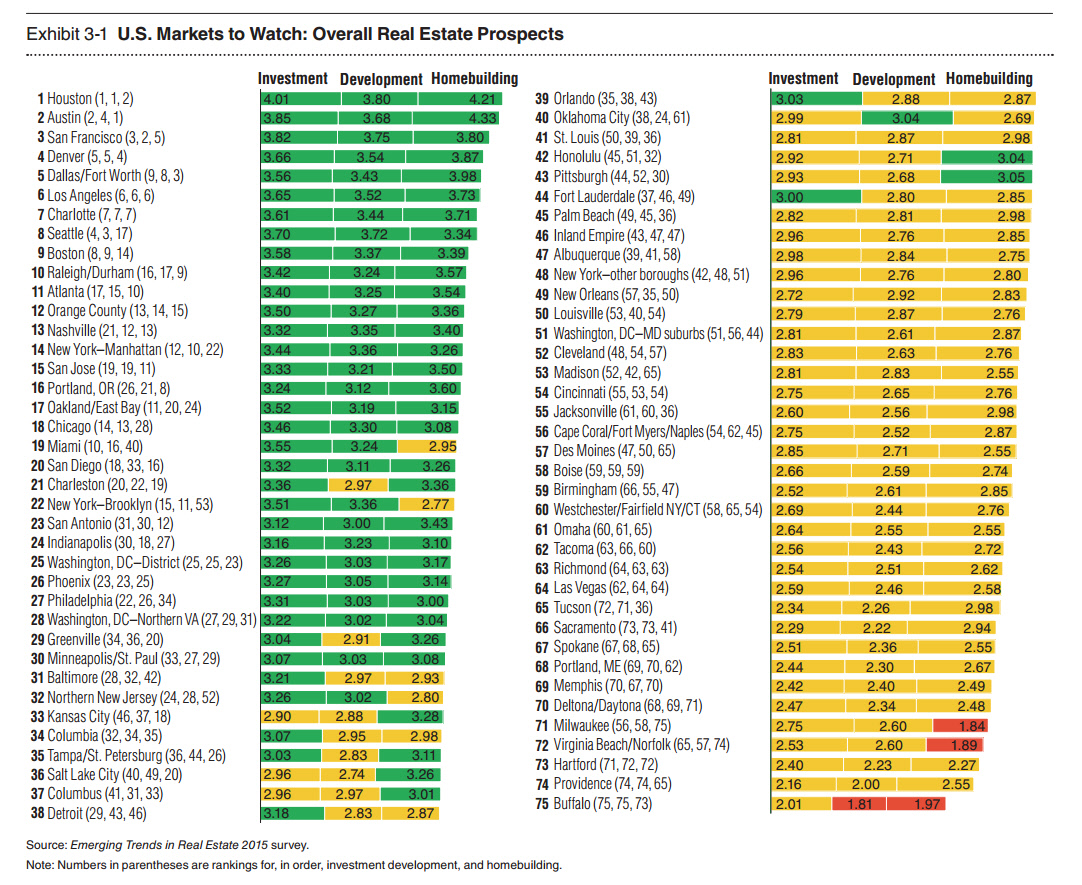Houston ranks top market to watch in the Urban Land Institute‘s Emerging Trends in Real Estate® 2015 series of trends and forecast publications that reflect the views of leading real estate executives around the world.
The strength of the Texas economy continues to dominate the rankings in 2015. Houston completes its ascent up the ranks and claims the number-one spot in this year’s survey. Austin moves to the number-two position, pushing perennial top market San Francisco to the number-three spot. Denver moves to the number-four spot, and the Dallas/Fort Worth market completes the Texas markets in the top 20, coming in at number five.
Real estate investors continue to be willing to pay record prices for assets in the major markets due to the fact that these markets offer less volatile returns of capital that can only be found in a limited number of markets across the globe. This year, interviewees reflected a desire to take on a measured amount of new risk in search of higher yields. Two strategies mentioned repeatedly with interviewees focused on moving to more opportunistic-style investments in the major markets or in markets close to a major metropolitan area, or looking for the best assets in markets outside of the core major markets. This year’s market rankings reflect the attractiveness of markets for both of these strategies.
A snapshot of the top five markets ranked by survey respondents and their outlook for each market:
- Houston – Houston offers a significant amount of investment opportunity. Investors believe that the energy industry will continue to drive market growth and that will support real estate activity in 2015. Houston was ranked number one in both investment and development expectations for next year; housing market expectations are ranked number two.
- Austin – Interviewees like the industrial base, the appeal to the millennial generation, and the lower cost of doing business in Austin. The market was a top choice for both the office sector and the single-family housing sector and the number two ranked market for retail. Interviewees are also attracted to Austin’s diverse employee base, and the market is an example of “jobs chasing people.”
- San Francisco – The decline from the number one spot last year, according to surveyed participants, is due more to growth in the other cities than any identifiable flaw in the San Francisco market. The strong local economy and improved domestic and international travel have made San Francisco the number one choice for hotel investment in 2015. Respondents ranked the office market number three and the retail market number four.
- Denver – Denver joins Austin and San Francisco as markets popular with the millennial generation. Denver’s industry exposure to the technology and energy industries has also attracted investor interest. The results of the survey put Denver retail at number five and office at number six.
- Dallas/Fort Worth – Interviewees raise the possibility that despite being ranked lower than Houston, the economic diversity could make the current growth rate more sustainable in Dallas/Fort Worth. The market continues to be attractive to real estate investors because of its strong job growth, which benefits from the low cost of living and doing business. Single-family housing in the market is the highest ranked property sector – and it also has the highest ranked industrial sector (number four) among the top five markets from this year’s survey.
Emerging Trends in Real Estate® provides an outlook on real estate investment and development trends, real estate finance and capital markets, property sectors, metropolitan areas, and other real estate issues.
The full report can be found here.
About the Urban Land Institute
Established in 1936, the Urban Land Institute (ULI) today has more than 30,000 members worldwide, representing the entire spectrum of the land use and development disciplines. ULI relies heavily on the experience of its members. It is through member involvement and information resources that ULI has been able to set standards of excellence in development practice. The Institute has long been recognized as one of the world’s most respected and widely quoted sources of objective information on urban planning, growth, and development.
 HKA Texas Humble, Kingwood, Atascocita, Texas Humble, Kingwood, Atascocita, Texas
HKA Texas Humble, Kingwood, Atascocita, Texas Humble, Kingwood, Atascocita, Texas




